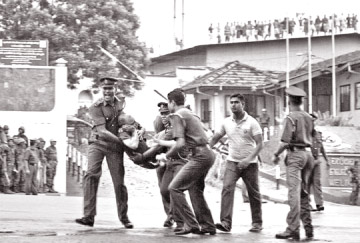Riot DECONSTRUCTED
 Last
week, the much awaited budget speech by President Mahinda Rajapaksa was
driven from the main news spot by the story of the riot by assault rifle
toting inmates of the Welikada Prison and its suppression with loss of
life. Last
week, the much awaited budget speech by President Mahinda Rajapaksa was
driven from the main news spot by the story of the riot by assault rifle
toting inmates of the Welikada Prison and its suppression with loss of
life.
Agency press reports of the armed uprising were picked up by the
World’s media and repeated extensively. Internet video websites such as
You Tube and Vimeo reproduced news footage of the incident, including
the evocative image of prisoners on the roof, some of them brandishing
their T-56 assault rifles.
|

Minister
Chandrasiri
Gajadeera |
In its aftermath, the world media highlighted calls from the
opposition United National Party (UNP) and from human rights groups for
an impartial inquiry into the matter.
The fact that Minister of Rehabilitation and Prison Reforms
Chandrasiri Gajadeera appointed a three member committee of inquiry,
which is to submit a comprehensive report to Parliament, has not
received similar coverage.
Mobile phones and drugs
The damage the incident did to the country is immense, although the
absence of an ethnic element did mitigate adverse coverage. For example,
BBC correspondent Charles de Havilland testified that ‘Friday's violence
does not seem to have been ethnic in nature. There are Sinhala, Tamil
and Muslim inmates.’
Even the media in allied countries have been cautious. Cuba’s Prensa
Latina news agency quoted Minister Chandrasiri Gajadeera, a member of
the Communist Party, as saying that the clashes began when commandos
raided in search of mobile phones and drugs.
However, it also pointed out that the Welikada prison, built in the
mid-nineteenth century by British Imperialists, keeps in its cells
hundreds of inmates, in crowded conditions. Along with other media
organisations, it called attention to another riot in the prison earlier
this year.
There are many probable causes for the riot, apart from overcrowding.
The fact that the government has been setting up a programme of prison
reform, including more ‘open prisons’, shows that there is much room for
improvement.
However, there is another factor that must be dealt with, explaining
why the prisoners were so ready to take up weapons and (according to
press reports) fire indiscriminately at the public road, endangering
innocent passers-by.
There has been a diminution in the respect accorded to human life in
this country, as witness the growing rate of crime in this country,
particularly of crimes of violence such as murder and rape.
|

Sri Lankan inmates shoot from the roof of a prison building as
guards carry an injured colleague outside Welikada prison in
recent attacks. Picture courtesy: International The News |
In Kahawatte, sixteen women over 50 years of age have been murdered,
many of them raped, in the past four years.
In Galle, a gang war which has caused twelve deaths in the past four
years culminated the other day in a man’s arms being hacked-off in broad
daylight, as crowds looked on.
‘Crime and bad lives,’ said H.G. Wells in ‘A Modern Utopia’, ‘are the
measure of a State’s failure, all crime in the end is the crime of the
community.’
Violence and crime
Our society has been degraded as much by the callous attitude of the
general public as by the horrifying circumstances of the crimes
themselves. Some victims are said to ‘deserve to die’, as if that
lessens the criminal nature of the circumstances of their demise. Even
worse is when women (especially foreigners) are said to have ‘deserved’
to be raped.
The extent of our society’s degeneration is shown by the willingness
of people to break the law in order to get ahead. A misdeed is a crime
only if one gets caught.
This degeneration of what is supposed to be a majority Buddhist
country is accompanied by the erection of more and more the Buddha
statues. Everywhere, brand new images of the Tathagatha look down upon
acts of violence and crime.
The political philosopher Hannah Arendt wrote in ‘On revolution’ that
‘Only crime and the criminal, it is true, confront us with the
perplexity of radical evil; but only the hypocrite is really rotten to
the core.’
This hypocrisy began with JR Jayawardene’s declaration after his
landslide electoral victory in 1977 of a ‘dharmista’ (just) society,
coincident with the inauguration of a wholesale assault on the homes and
persons of leftists by UNP goons, which morphed within a couple of weeks
into an anti-Tamil pogrom.
The ‘dharmista society’ was responsible for violent assaults on
striking workers, for more pogroms against Tamil people, for double
promotions for policemen harassing opposition women and attacks on
members of the judiciary.
‘Dharmista society’
When the BBC’ de Havilland reports that ‘in the past there have been
racist killings, most notoriously in July 1983 when 53 Tamil prisoners
were massacred during broader anti-Tamil pogroms’, he does not mention
that it was the ‘dharmista’ rulers who were responsible.
When the UNP’s Mangala Samaraweera calls the suppression of the riot
a ‘massacre’, he forgets that when he and our President led the ‘Padha
Yathra’ march against disappearances, it was against the regime of the
party from whose ranks he now speaks.
The ‘dharmista society’ also coincided with the growth of mafias,
criminal elements taking over all aspects of society. For the first
time, heroin became a problem. Even such seemingly innocuous areas as
the trade in food commodities were expropriated by mafiosi.
It was in this era that patronage by politicians grew to be a means
to impunity: the garage number plate was transformed into a symbol of
exemption from the law. Even ‘VIP’ labels, used to allocate parking
places to vehicles during government-organised events, were converted
into notices of immune eminence.
Today, ministry staffs are eternally importuned by armies of hangers
on for these markers of rank. This writer recently saw a BMW bearing a
‘VIP’ parking sticker dating back eight months to International Women’s’
Day!
The government must act against the criminalisation of our society,
against the attitude that transgression is permissible if one is not
apprehended. It could start by removing the element of impunity.
The state could do worse than begin by eliminating those
representative emblems of immunity, the garage number plate and the
‘VIP’ sticker displayed by all and sundry. |





